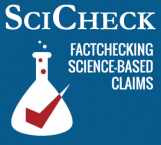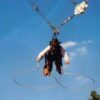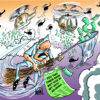COVID-19 Vaccination Increases Immunity, Contrary to Immune Suppression Claims
![]()
COVID-19 Vaccination Increases Immunity, Contrary to Immune Suppression Claims
Posted on July 29, 2022 | Corrected on July 30, 2022
SciCheck Digest
The mRNA COVID-19 vaccines teach the immune system to recognize and fight the coronavirus, greatly reducing the likelihood of severe disease if a person is infected. There is no evidence the vaccines impair immunity, as some, including Fox News’ Tucker Carlson, have baselessly claimed.

How safe are the vaccines?
Full Story
The two messenger RNA, or mRNA, COVID-19 vaccines from Pfizer/BioNTech and Moderna work by priming the immune system so it can respond more quickly to a coronavirus infection. Large, randomized controlled trials and a substantial body of real-world data support the effectiveness and safety of the vaccines, which continue to provide strong protection against serious illness and death, especially after one or two booster doses.
Conservative television host Tucker Carlson, however, argued that the vaccines might be harming the immune system. On his July 21 broadcast on Fox News, he used dubious sources and cherry-picked and misrepresented data to incorrectly conclude that “it’s looking likely that the vaccine might suppress the immune system.” His comments were also shared on social media.
“Is it possible that the vaccine actually can hurt you, especially if you keep getting boosted? Can it weaken your immune system? Well, that looks possible,” he said, citing the journal Food and Chemical Toxicology, which he said “published the findings of several mRNA researchers, and we’re quoting, ‘In this paper, we present evidence that vaccination induces a profound impairment in type one interferon signaling, which has diverse adverse consequences to human health.’”

Carlson went on to wonder why the press hadn’t covered the paper, which he quoted from again.
“In fact, it’s looking likely that the vaccine might suppress the immune system,” he said. “This fact, the authors concluded, will ‘have a wide range of consequences, not the least of which include the reactivation of latent viral infections and the reduced ability to effectively combat future infections.’”
Carlson then falsely claimed that a study in the prestigious British journal the Lancet made “similar findings.”
Virtually none of what Carlson said was accurate, however. It’s not “fact” that the vaccines suppress the immune system, nor is there any reliable evidence to suggest that it could be true. The paper that Carlson cites, which was written by some individuals opposed to COVID-19 vaccination, misrepresents and distorts other scientists’ findings to make illogical and unfounded claims.
The lead author of the Lancet paper similarly told us that his work, which Carlson misrepresented, “does not show any” of what Carlson alleged.
Unreliable Food and Chemical Toxicology Paper
Carlson’s primary evidence for the vaccines harming the immune system is a much-criticized Food and Chemical Toxicology paper written by several individuals known for being opposed to vaccination or for spreading health misinformation.
Lead author Stephanie Seneff is a computer scientist at the Massachusetts Institute of Technology who has falsely claimed that vaccines cause autism and has pushed a theory linking the herbicide glyphosate to COVID-19, among other unfounded scientific views. Senior author Dr. Peter McCullough is an internist who has repeatedly spread misinformation about COVID-19 treatments and the vaccines. Another author, Greg Nigh, practices naturopathy, a form of alternative medicine that has often embraced pseudoscientific methods.
When the paper was first published in April, numerous critics condemned it, with some calling for it to be retracted. (That effort was denied. Notably, the paper appeared in the journal after the editor-in-chief put a call out for papers “on potential toxic effects of COVID-19 vaccines.”)
The paper, which does not present any original research, is a review coupled with an analysis of data from the Vaccine Adverse Event Reporting System, the United States’ early warning system to detect possible safety problems with vaccines. VAERS reports can be submitted by anyone, are not vetted for accuracy, nor do they mean that a reported symptom was necessarily caused by the vaccine; the data have often been mined to incorrectly claim vaccines are dangerous.
Some parts of the literature review are correct, but the conclusions the authors draw about immune function following vaccination are unfounded, experts told us — and the VAERS analysis is flawed, as Jeffrey S. Morris, a biostatistician at the University of Pennsylvania, has explained on Twitter and on his blog.
“This long review article presents many details about various biological pathways, but their links to mRNA vaccines are almost wholly speculative. In some cases, they link to other vaccines, old mRNA technology, or COVID-19 infection, but are not directly linked to mRNA vaccines,” Morris wrote.
“In fact, so much of their evidence is from papers on severe COVID-19 infections, not vaccination, much content in this article might be better suited to a paper pointing out potential downstream dangers of severe COVID infections rather than raising alarm about mRNA vaccination,” he added.
One of the paper’s core claims is that the mRNA COVID-19 vaccines suppress the innate immune system, specifically the type I interferon response. Interferons are antiviral proteins that help limit the spread of a viral infection, although they also can lead to harmful inflammation. This is the supposed basis the authors use — and Carlson cites — to claim that the vaccines would make it harder to respond to infections and increase the risk of cancer.
But experts who study the interferon response say that’s bogus.
“I am not aware of any report that demonstrates what [is] claimed in the review,” Ivan Zanoni, an immunologist at Boston Children’s Hospital who has studied the interferon response in patients infected with the coronavirus, told us in an email.
It “doesn’t make any sense with what we know about the vaccine and how it works, and neither it makes sense to what we know about how the immune system works,” he added.
Elina Zúñiga, a molecular biologist at the University of California San Diego who studies interferon and has reviewed its role with COVID-19, agreed.
“The authors make some connections to speculate on a possibility, but there is no data or scientific evidence supporting the statement that interferon signaling is suppressed in vaccinated individuals,” she told us in a phone interview.
In fact, Zanoni said, available evidence contradicts the notion that vaccination reduces a person’s ability to mount an interferon response. One paper, he said, reported that people who had received one dose of the Pfizer/BioNTech vaccine prior to being hospitalized for COVID-19 had a better antiviral interferon response than those who were not vaccinated.
Another paper also argues against the idea, Zanoni said. A lab at Rockefeller University discovered early in the pandemic that a subset of people who develop severe COVID-19 produce antibodies that block their own interferons. These antibodies prevent the interferons from helping fight the coronavirus early in infection, and likely explain the severe disease. The same lab has since found that the same applies to vaccinated people — and that individuals with the interferon autoantibodies are likely to be at higher risk of severe illness, even after vaccination.
If the vaccines were suppressing the interferon response, as the review proposes, vaccinated people with autoantibodies would not be at higher risk because interferons would already be suppressed, Zanoni said.
To make its claim that the vaccines suppress interferon, the Food and Chemical Toxicology review cites an unpublished study that found a much larger interferon response in certain immune cells from people with active coronavirus infections compared with those from people before and after vaccination.
But an author of the study told us that’s an incorrect interpretation of the findings.
“We observed higher levels of interferon signaling in cells from patients with COVID-19 illness than in adults receiving the mRNA vaccines. The paper citing our work is misinterpreting the lack of inflammation to be the same as ‘active suppression,’” Sergei B. Koralov, the senior author of the study and an immunologist at the New York University Grossman School of Medicine, told us in an email. He added that his group “did not see anything in our data that implies active suppression.”
“We saw very low levels of inflammation in the immune cells following mRNA vaccine in contrast to the high levels that we saw with SARS-CoV-2 virus infection,” he said. “The main message of our manuscript is that even in the absence of inflammation found in the course of infection, vaccination elicits a robust and long-lasting immune response.”
Indeed, less inflammation in the context of a vaccine is part of the point — a vaccine is supposed to provide immunity without the harmful effects of infection.
“This is not surprising at all and there’s nothing wrong with that,” Zúñiga said of the lower interferon response following vaccination.
She also iterated that the finding in no way suggested that the vaccines would diminish the immune system’s interferon response to other pathogens.
Misrepresented Lancet Study
In an effort to lend credibility to his argument, Carlson also claimed that a Lancet publication supported the conclusions of the Food and Chemical Toxicology paper. Except that’s not right, either.
The Lancet paper recommended third-dose COVID-19 vaccine boosters.
Carlson cited a comment a Japanese physician, Dr. Kenji Yamamoto, published in a different journal, which claimed the Lancet paper “showed that immune function among vaccinated individuals 8 months after the administration of two doses of COVID-19 vaccine was lower than that among the unvaccinated individuals.”
After suggesting that the Lancet paper hid “a major finding,” Carlson pointed to one piece of data in table 3 of the paper for viewers to check themselves. “Among people around the age of 80 who have been double vaccinated — that would include people like Joe Biden — the per capita rate of medical incidences, including hospitalizations or death, is nearly twice as high as the rate of serious incidence for the unvaccinated,” he said.
Carlson added that the Lancet paper “also includes a chart showing negative vaccine efficacy for all ages after eight months for all participants in the study.”
Carlson, however, is d




















